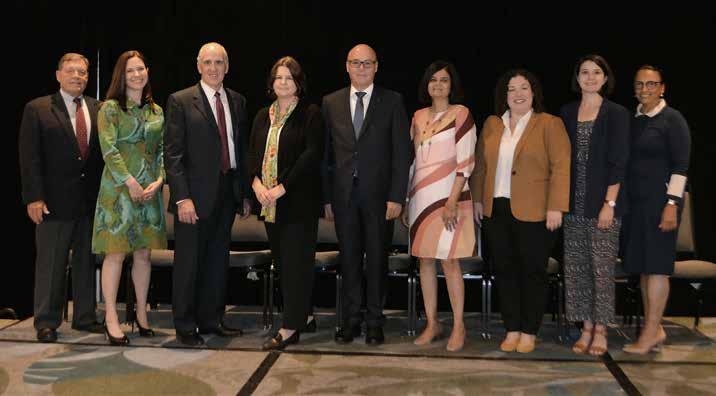
4 minute read
Maternal Multiple Micronutrient Supplementation (MMS): There is no turning back
from Sight and Life Special Report | Focusing on Multiple Micronutrient Supplementation in Pregnancy
Klaus Kraemer
Sight and Life, Basel, Switzerland
Advertisement
Key messages
∙ Multiple micronutrient supplementation (MMS) has the potential to save the lives of women and children, in particular, and strengthen antenatal care (ANC) and health systems around the world. ∙ Over the past two decades, evidence has been generated showing the efficacy and cost-effectiveness of MMS; there has also been a cocomitant increase in the number of low- and middle-income countries (LMICs) seeking guidance on how to safely and affordably provide MMS during pregnancy. ∙ However, the lack of information due to data gaps and clear global and national guidance on micronutrient deficiencies is holding LMICs back. ∙ To address these issues and harness the potential of MMS,
Sight and Life and other organizations are working across several fronts – from research to project implementation to joint advocacy – to ensure that MMS is available to the most vulnerable. ∙ The current COVID-19 pandemic will disrupt food systems in many parts of the world, reducing the general availability of nutritious, micronutrient-rich foods. Communicating the proven benefits of MMS for pregnant women is therefore more important than ever during this challenging time.
Improving maternal nutrition
Nutrition is fundamental to human health and development. Addressing malnutrition saves lives, reduces inequalities, and builds strong and resilient individuals, families, communities and populations.
Women are particularly vulnerable to malnutrition in all its forms and, during pregnancy, their children can be negatively impacted. Any form of malnutrition during a woman’s pregnancy can have lasting repercussions on fetal and child development, as growth failure can be transmitted from mother to child. It is therefore vital to ensure adolescent and maternal nutrition to protect the health and wellbeing of women and their children, boosting gender equality and breaking the vicious cycle of poverty.
A component of poor nutrition is micronutrient deficiency, which can have devastating impacts on maternal health and pregnancy outcomes. Over half of adolescent girls and young women in low- and middle-income countries (LMICs) have inadequate micronutrient intake. Rates of anemia in women of reproductive age increased between 2000 and 2016 – from 31.6 percent to 32.8 percent globally – and little progress has been made in recent years. Because of this and other factors, more than 300,000 women currently die from pregnancy or childbirthrelated complications. And each year, ~20.5 million babies are born with low birth weight (LBW), accounting for 14.6 percent of all births worldwide, with the majority in sub-Saharan Africa and South Asia.
The burden of micronutrient deficiencies is still poorly understood in most countries because of vast data gaps and a lack of clear global and national guidance. This applies equally to potential solutions. The good news is that the tide is turning. Catalytic commitments have been made to make multiple micronutrient supplementation (MMS) available to those who need it the most, and research from the past two decades has demonstrated a solid evidence base and
documented the widespread need for new approaches to combat deficiencies in key vitamins and minerals. New evidence and specific requests from individual countries have also inspired a sea change in the international community. There is no turning back.
MMS retrospective
My personal appreciation of vitamins and minerals dates back to my training as a nutrition scientist, during which I learned about the role these micronutrients play in metabolism and health. Throughout my early career, I admired Sight and Life for supporting vitamin A supplementation programs around the world in the 1980s and 1990s, and then expanding its focus to cover the full range of micronutrients towards the end of the 20th century. When, in 2005, I became the Director of Sight and Life, I found myself in the privileged position of being able to push these initiatives further.
For example, in early 2006, I had the opportunity to gain deep insights into JiVitA, a high-quality, community-based research program run by Johns Hopkins Bloomberg School of Public Health (JHBSPH). Operational since 2001 in northwest rural Bangladesh, JiVitA has examined – and continues to examine – the critical role of micronutrient deficiency prevention in reducing mortality and morbidity and improving child development during the first 1,000 days and beyond. Its goal is to inform and guide policies and programs through the conduct of large-scale, communitybased nutrition studies.
In 2008, Sight and Life facilitated local MMS production in Bangladesh of 16 million tablets for a JiVitA study (JiVitA-3) of 45,000 pregnant women. The trial showed that daily MMS throughout pregnancy offered greater health benefits than an iron-folic acid (IFA) supplement alone, reducing the numbers of preterm birth, LBW and stillbirth by 10–15 percent. A subsequent trial (JiVitA-5) is currently being implemented. This trial is focused on prenatal supplementation of adolescent girls and women under 20 years of age, using MMS from the same local producer as in 2008. The dedication of the JHBSPH team over the years, under the leadership initially of Al Sommer and Keith West, has delivered findings that have transformed our understanding of the potential of MMS; however, that important work is not yet finished.
Despite numerous studies confirming the benefits of MMS over IFA, in 2016 the World Health Organization (WHO) released antenatal care (ANC) guidelines that recommend IFA, while simultane-
© Sight and Life
Together, the ‘Power for Mothers’ speakers present the importance of MMS during the Women Deliver conference in Vancouver, Canada. Left to right: Robert Black, Johns Hopkins University Bloomberg School of Public Health; Joanna Mikulski, CIFF; Spencer Kirk, Kirk Humanitarian; Kristen Hurley, Vitamin Angels; Klaus Kraemer, Sight and Life; Parul Christian, Bill & Melinda Gates Foundation; Emily Smith, Bill & Melinda Gates Foundation; Danielle Porfido, 1,000 Days; and Lenore Spies, KwaZulu-Natal Department of Health.










